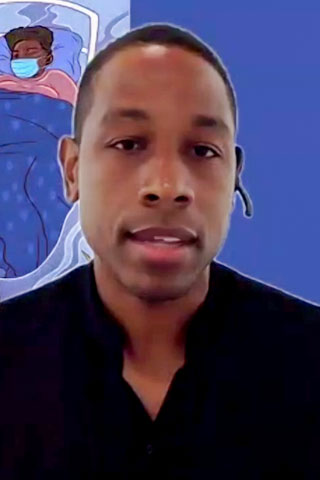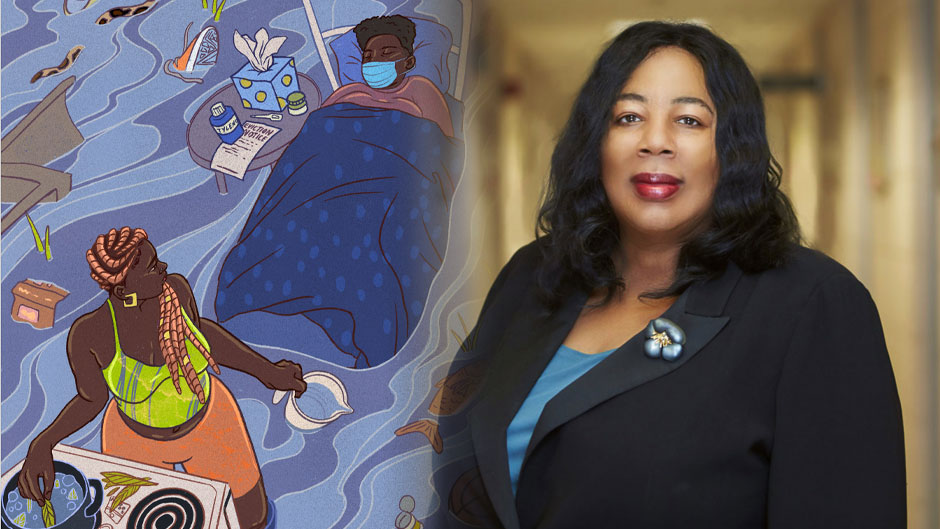When clinical trials to test the first vaccines for COVID-19 began last year, Harriet A. Washington remembers medical journalists decrying the fact that too few Black people were signing up and that their absence could skew the results, even delay the vaccines.
But noticeably missing from the reports, Washington said during the University of Miami’s inaugural Climate and Racial Justice Talk on Monday, was any supporting documentation. So, the acclaimed medical ethicist, science writer, and researcher requested data from Johns Hopkins University, which showed that about 10 percent of the participants in the Moderna and Pfizer-BioNTech trials were Black people—who constitute more than 12 percent of the U.S. population.
Calling 10 percent representation “a very respectable showing,” Washington said Black people were obviously not failing to show up. “We were told that, but the data told us something different,” she told a virtual audience of more than 300, making her point by adding her own pointed questions.
“How useful is hearing this if you’re not talking about other ethnic groups?” she continued. “You’re saying that African Americans were reluctant to sign up, but vaccine skepticism is rife in this country and most vaccine skeptics are white, not black. Why was their no interrogation or focus on whites refusing to sign up?”

In a far-ranging virtual conversation with Dr. Armen Henderson, an assistant professor of medicine at the Miller School of Medicine, Washington demonstrated why Henderson said she was the ideal person to kick off the series aimed at inspiring a new generation of antiracism and climate justice scholars and advocates.
Through a social justice grant awarded by the University of Miami Laboratory for Integrative Knowledge (U-LINK), Henderson and other members of his U-LINK team hope to create a climate justice course, and a network of scholars and researchers who can collaborate with community partners to address the impacts of racism that are likely to be exacerbated by warming temperatures and rising seas.
And Washington has devoted her long and prolific career to researching and documenting the consequences of such historic race-based policies and practices in housing, health, and the environment. One of her first books, “Medical Apartheid,” exposed the medical establishment’s shameful history of exploiting Black people, who in the name of research, endured surgery without anesthesia, forced sterilization, and testing of potentially deadly medications.
Her latest book, “A Terrible Thing to Waste: Environmental Racism and Its Assault on the American Mind,” attributes the reported IQ gap between Black and white people to race-based policies and practices that relegated people of color to communities where toxic waste, pollution, and insufficient sanitation continue to expose them to metals, neurotoxins, poor nutrition, and infection-causing pathogens that rob their intellectual power.
Referencing her exhaustive research on the subject, she said on Monday that although poor people are at risk from environmental hazards, race remains the single most important predictor of exposure to environmental harms.
“Although a lot of the dialogue, a lot of the talk, is focused on poverty, the reality is it’s not poverty, it’s race,” she said, noting that middle-class Black people who earn $50,000 to $60,000 a year are more exposed to environmental toxins than poor white people, who earn an average of $10,000 a year.
“That’s dirt poor, right? You can’t get much poorer than that. And yet they don’t have as much exposure as middle-class African Americans. So it’s not all socioeconomics, but race that is driving these risks,” she said. “Very often we invoke climate change and it is devastating, including its effect on health. But for many people of color in this country it’s not climate change, it’s climate, period.”
As such, she said, Black people aren’t eagerly joining forces with environmental groups that are concerned about such things as maintaining water purity or wild areas in their pristine state. “All of that is important and good, but it doesn’t have anything to do with the survival concerns of many people of color,” she said. “They don’t always have the luxury of worrying about preserving wild areas. They’re worried about the lead in their water. They’re worried about the poisons they breathe in every day. They’re worried about the coronavirus, COVID-19, decimating their communities.”
But, Washington said, she is heartened by the growing awareness among “quote unquote white groups” like the Sierra Club, that are beginning to understand how interwoven environmental racism is to their causes. As she noted, five years ago, the Sierra Club elected its first Black president, Aaron Mair, an epidemiologist for the New York State Department of Health who has long been involved in the environmental justice movement.
“I think that’s a good thing,” Washington said. “Stronger together. We’re beginning to see a shared ground.”
And that’s exactly what the antiracism/climate justice U-LINK team is determined to build—a strong and collaborative platform for equitably addressing the consequences of historic racism as South Florida’s climate continues to change.
To register for and learn more about the forthcoming Monday evening dialogues, visit the Climate and Justice Talk Series, which will feature Miami Climate Justice Leadership, on Feb. 22; Miami Climate Justice Activism, on March 22; and Energy and Housing Justice in a Changing Climate, on May 3. All the events are on Mondays, and all are being held at 6:30 p.m.

